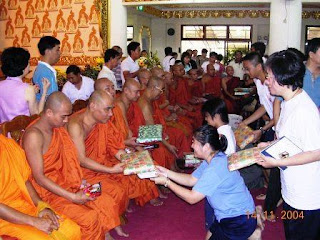Patti Dana (Sharing of Merit)
 Sharing of benefits of your good deeds to others is known as patti dana (patti - what you had gained and dana - sharing your merit). A donor with no doubt enjoy the benefits of his dana. The desire to share with others the merits gained is indeed magnanimous.
Sharing of benefits of your good deeds to others is known as patti dana (patti - what you had gained and dana - sharing your merit). A donor with no doubt enjoy the benefits of his dana. The desire to share with others the merits gained is indeed magnanimous.We all, ater doing a good deed, should proclaim, "all those who can hear me, come and share my merits. May you all gain as much benefits as I do," and share the benevolence gained. This is patti dana, which in itself is a separate good deed.
Caution: Some donors just verbally say, "come and share my merits" but have no sincere wish to do so. Such perfunctory sharing does not qualify as patti dana.
Once upon a time, a donor invited many people to his son's novitiation and gave lavish feast. The contributions (from invitees) did not cover the expenses of the feast, so he was left in debt. After the ceremony came the time to share merits. At that time, he was mentally calculating how much he would owe.
Somebody beside him reminded him to share merits. Oppressed by the thought of a heavy debt, he said, "I am dead broke," very loudly instead of saying, "come and share my merits."
Sharing merit does not lessen your due
When you have done a wholesome deed and share the merit gained, you might reason that your benefits will lessen. We must remember that merits are gained in accord with your cetana. When we give charity with a true goodwill, we have already done a good deed and for that we have already gain due merit.
So, when we share the merits gained to others, you gain additional benefit for your magnanimity. There is no reason your merits will be lessened.
The sharing of merit is like kindling oil lamps with a lighted lamp. The first oil lamp is of course lighted by striking a match. But this first lamp can be used to kindle many other lamps; the luminosity of the first lamp will in no way be diminished regardless of how many more lamps are kindled.
The combined brightness of all the lamps will be many times more radiant. sharing merits gained from sila kusala and bhavana kusala are also patti dana.



Comments